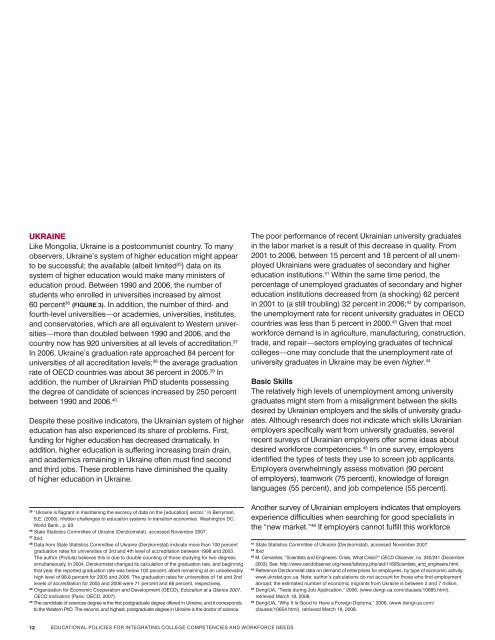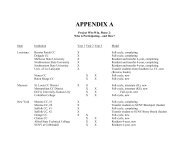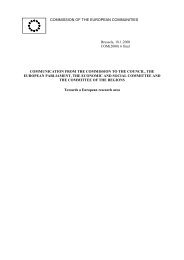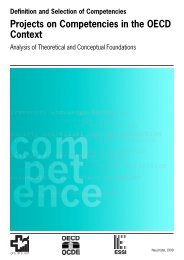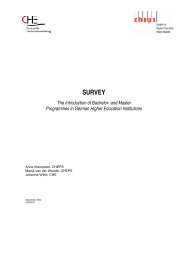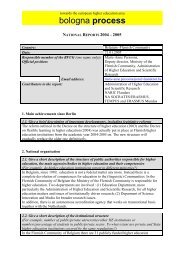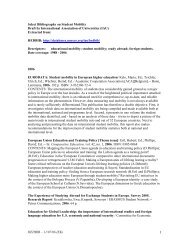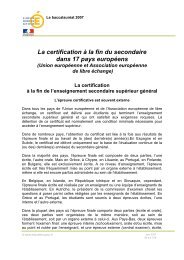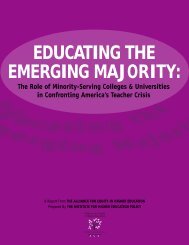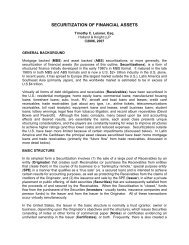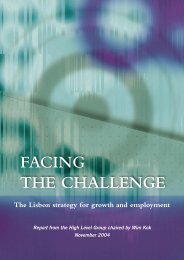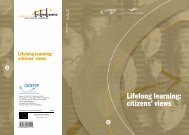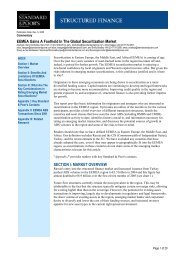Educational Policies for Integrating College Competencies and ...
Educational Policies for Integrating College Competencies and ...
Educational Policies for Integrating College Competencies and ...
Create successful ePaper yourself
Turn your PDF publications into a flip-book with our unique Google optimized e-Paper software.
UKRAINELike Mongolia, Ukraine is a postcommunist country. To manyobservers, Ukraine’s system of higher education might appearto be successful; the available (albeit limited 35 ) data on itssystem of higher education would make many ministers ofeducation proud. Between 1990 <strong>and</strong> 2006, the number ofstudents who enrolled in universities increased by almost60 percent 36 (Figure 3). In addition, the number of third- <strong>and</strong>fourth-level universities—or academies, universities, institutes,<strong>and</strong> conservatories, which are all equivalent to Western universities—morethan doubled between 1990 <strong>and</strong> 2006, <strong>and</strong> thecountry now has 920 universities at all levels of accreditation. 37In 2006, Ukraine’s graduation rate approached 84 percent <strong>for</strong>universities of all accreditation levels; 38 the average graduationrate of OECD countries was about 36 percent in 2005. 39 Inaddition, the number of Ukrainian PhD students possessingthe degree of c<strong>and</strong>idate of sciences increased by 250 percentbetween 1990 <strong>and</strong> 2006. 40Despite these positive indicators, the Ukrainian system of highereducation has also experienced its share of problems. First,funding <strong>for</strong> higher education has decreased dramatically. Inaddition, higher education is suffering increasing brain drain,<strong>and</strong> academics remaining in Ukraine often must find second<strong>and</strong> third jobs. These problems have diminished the qualityof higher education in Ukraine.35“Ukraine is flagrant in maintaining the secrecy of data on the [education] sector.” In Berryman,S.E. (2000). Hidden challenges to education systems in transition economies. Washington DC:World Bank., p. 8336State Statistics Committee of Ukraine (Derzkomstat), accessed November 2007.37Ibid.38Data from State Statistics Committee of Ukraine (Derzkomstat) indicate more than 100 percentgraduation rates <strong>for</strong> universities of 3rd <strong>and</strong> 4th level of accreditation between 1998 <strong>and</strong> 2003.The author (Prytula) believes this is due to double counting of those studying <strong>for</strong> two degreessimultaneously. In 2004, Derzkomstat changed its calculation of the graduation rate, <strong>and</strong> beginningthat year, the reported graduation rate was below 100 percent, albeit remaining at an unbelievablyhigh level of 98.8 percent <strong>for</strong> 2005 <strong>and</strong> 2006. The graduation rates <strong>for</strong> universities of 1st <strong>and</strong> 2ndlevels of accreditation <strong>for</strong> 2005 <strong>and</strong> 2006 were 71 percent <strong>and</strong> 68 percent, respectively.39Organization <strong>for</strong> Economic Cooperation <strong>and</strong> Development (OECD), Education at a Glance 2007.OECD Indicators (Paris: OECD, 2007).40The c<strong>and</strong>idate of sciences degree is the first postgraduate degree offered in Ukraine, <strong>and</strong> it correspondsto the Western PhD. The second, <strong>and</strong> highest, postgraduate degree in Ukraine is the doctor of science.The poor per<strong>for</strong>mance of recent Ukrainian university graduatesin the labor market is a result of this decrease in quality. From2001 to 2006, between 15 percent <strong>and</strong> 18 percent of all unemployedUkrainians were graduates of secondary <strong>and</strong> highereducation institutions. 41 Within the same time period, thepercentage of unemployed graduates of secondary <strong>and</strong> highereducation institutions decreased from (a shocking) 62 percentin 2001 to (a still troubling) 32 percent in 2006; 42 by comparison,the unemployment rate <strong>for</strong> recent university graduates in OECDcountries was less than 5 percent in 2000. 43 Given that mostwork<strong>for</strong>ce dem<strong>and</strong> is in agriculture, manufacturing, construction,trade, <strong>and</strong> repair—sectors employing graduates of technicalcolleges—one may conclude that the unemployment rate ofuniversity graduates in Ukraine may be even higher. 44Basic SkillsThe relatively high levels of unemployment among universitygraduates might stem from a misalignment between the skillsdesired by Ukrainian employers <strong>and</strong> the skills of university graduates.Although research does not indicate which skills Ukrainianemployers specifically want from university graduates, severalrecent surveys of Ukrainian employers offer some ideas aboutdesired work<strong>for</strong>ce competencies. 45 In one survey, employersidentified the types of tests they use to screen job applicants.Employers overwhelmingly assess motivation (90 percentof employers), teamwork (75 percent), knowledge of <strong>for</strong>eignlanguages (55 percent), <strong>and</strong> job competence (55 percent).Another survey of Ukrainian employers indicates that employersexperience difficulties when searching <strong>for</strong> good specialists inthe “new market.” 46 If employers cannot fulfill this work<strong>for</strong>ce41State Statistics Committee of Ukraine (Derzkomstat), accessed November 2007.42Ibid43M. Cervantes, “Scientists <strong>and</strong> Engineers: Crisis, What Crisis?” OECD Observer, no. 240/241 (December2003). See: http://www.oecdobserver.org/news/fullstory.php/aid/1160Scientists_<strong>and</strong>_engineers.html.44Reference Derzkomstat data on dem<strong>and</strong> of enterprises <strong>for</strong> employees, by type of economic activity:www.ukrstat.gov.ua. Note: author’s calculations do not account <strong>for</strong> those who find employmentabroad; the estimated number of economic migrants from Ukraine is between 2 <strong>and</strong> 7 million.45DengiUA, “Tests during Job Application,” 2006, (www.dengi-ua.com/clauses/10685.html),retrieved March 18, 2008.46DengiUA, “Why It Is Good to Have a Foreign Diploma,” 2006, (www.dengi-ua.com/clauses/10654.html), retrieved March 18, 2008.12 EDUCATIONAL POLICIES FOR INTEGRATING COLLEGE COMPETENCIES AND WORKFORCE NEEDS


